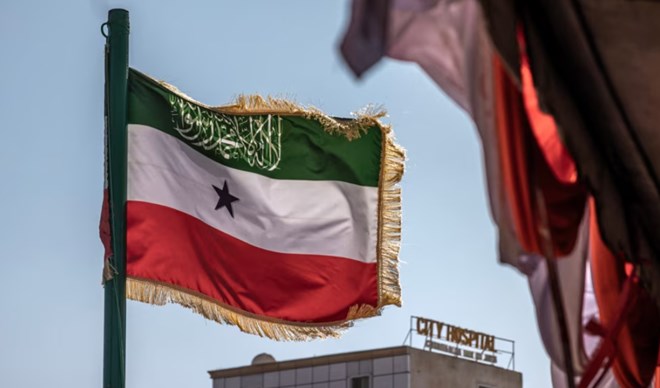
By Mohamed Olad Hassan
Tuesday November 12, 2024

The flag of Somaliland is seen during a campaign rally in Hargeisa on Nov. 8, 2024, ahead of the 2024 Somaliland presidential election.
According to the Somaliland National Electoral Commission, more than 1 million registered and eligible voters head to the polls Wednesday to elect their president for the next five years.
Three candidates, including incumbent President Muse Bihi Abdi, seek to consolidate the region’s fragile democracy, boost economic growth and gain international recognition that the Somali enclave has struggled to secure for 33 years.
Abdi, of the ruling Peace, Unity and Development Party, also known simply as Kulmiye, seeks a second term in Wednesday’s polls.
He is running against Abdirahman Mohamed Abdullahi, known as "Irro,” of the Waddani party and Faisal Ali Warabe of the Justice and Development Party, or UCID.
Promises
In an interview with VOA Somali, each of the three candidates promised to strengthen democracy, boost economic growth and seek international recognition for the breakaway region.
Abdi, 76, who was elected head of the region in 2017, has pledged there will be progress on a controversial maritime deal that Ethiopia signed with Somaliland earlier this year.
“On our side, we [Somaliland] are free, we are ready to implement the MOU [Memorandum of Understanding], and we are waiting from the Ethiopian side so that we can go ahead with it,” Abdi said. “Ethiopia needs access to sea, and we need recognition, and this MOU is about these needs.”
This is the fourth presidential election since the region on the northwestern tip of Somalia broke away from the rest of the country, following the collapse of the Siad Barre regime in 1991.
The territory declared independence that year but has never achieved international recognition.
Despite this, Somaliland has a functioning government and institutions, a political system that has allowed democratic transfers of power between rival parties, its own currency, passport and armed forces.
According to Freedom House's 2024 flagship annual report, which assesses the condition of political rights and civil liberties around the world, Somaliland experienced an erosion of political rights in the past several years.
The report said, “Journalists and public figures face pressure from authorities. Minority clans are subject to political and economic marginalization, and violence against women remains a serious problem.”
Talks between Somaliland, which is seeking full statehood, and Mogadishu, which fiercely opposes the move, have been held on and off between 2012 and 2020 but failed to bear fruit.
Irro, of the Waddani party, who also served as speaker of the House of Representatives of Somaliland’s lower chamber of parliament for more than 11 years, said he would resume talks with Somalia.
“It was not our choice to talk to Somalia because our goal has always been getting recognition, but the international community urged us to talk. If I am elected, I will resume the talks if the Somaliland interest lies there, and [at] the same time we will review the previous failed talks,” said Irro.
Warabe, of the Justice and Development Party, said that if elected, he would seek recognition through the establishment of a national unity government in Somaliland.
“The return of Bihi [Abdi], who has been for seven years in power, and his party, which has been in power since 2010, is not [an] option for Somaliland voters,” Warabe said. “If I am elected, I will lead Somaliland to recognition and [a] more prosperous road.”
Regional tension
Somaliland’s Wednesday vote comes at a time when tensions remain high between Somalia and Ethiopia over the controversial Memorandum of Understanding that Ethiopia signed with Somaliland.
The deal would grant Ethiopia a 50-year lease of access to 20 kilometers of the Red Sea coastline in exchange for the potential recognition of Somaliland's independence, which Somalia views as a violation of its sovereignty and territorial integrity.
The deal signed on January 1 in Addis Ababa by Abdi and Ethiopia Prime Minister Abiy Ahmed sparked anger in Mogadishu, which considers Somaliland as part of its national territory. The opposition to the deal plunged the two neighboring countries into a deadlocked situation.
In April, Somalia expelled Ethiopian Ambassador Muktar Mohamed Ware, alleging "internal interference" by Ethiopia. Somalia also ordered the closure of Ethiopia's consulates in Somaliland and Puntland, although they remained open.
Last month, Somalia expelled Mogadishu-based Ethiopian diplomat Ali Mohamed Adan, who was a counselor at Ethiopia's embassy in Mogadishu.
In July and August 2024, two rounds of talks between Ethiopia and Somalia, mediated by Turkey, failed to solve the dispute, with Somalia demanding Ethiopia withdraw from the deal and Ethiopia insisting that it does not infringe on Somalia’s sovereignty.
On Saturday, Somali Defense Minister Abdulkadir Mohamed Nur repeated the Somali government position against Ethiopian troop involvement in a new African Union peacekeeping mission in Somalia starting in January.
“I can say that Ethiopia is the only government we know of so far that will not participate in the new AU mission because it has violated our sovereignty and national unity," Nur said Saturday in a government-run television interview.
Somaliland’s last presidential elections were held in 2017. The current presidential election was originally set to take place in 2022 but was postponed until 2023 and then again pushed back to November 2024, following a controversial extension of Abdi’s mandate by the parliament’s upper house.
The Somaliland National Election Commission, or NEC, said at the time that the delays were due to “time, technical and financial constraints.” Opposition parties vehemently denounced the delays.
The president is directly elected for a maximum of two five-year terms and appoints the Cabinet.
Sahra Eidle Nur and Harun Maruf contributed to this report.